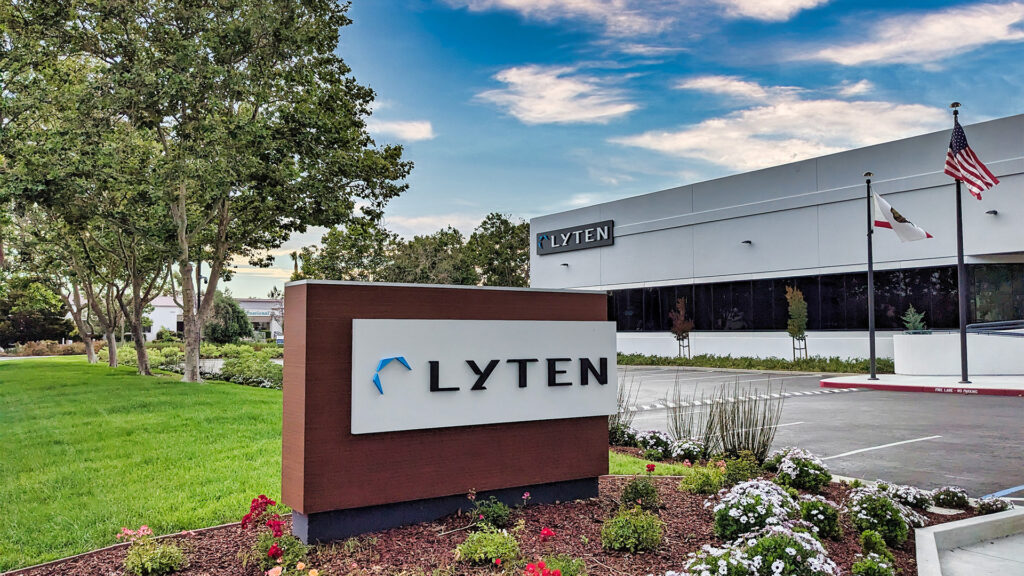
Lyten, Inc., headquartered in San Jose, raised $200 million in equity financing to commercialize and accelerate production scale-up of lithium-sulfur energy storage, composites, and other applications using Lyten 3D Graphene.™ (Photo: Business Wire)
Lyten is working to commercialize its lithium-sulfur batteries, light-weighted composites, and next-generation IoT sensors.
SAN JOSE, Calif.—Lyten, Inc., a pioneer in 3D graphene decarbonizing supermaterials, reported it raised $200 million, as part of its over-subscribed Series B funding round, to scale manufacturing and commercialize its first three product lines: lithium-sulfur batteries, lightweighted composites, and next generation IoT sensors. The round is led by Prime Movers Lab, a venture capital firm that focuses on investments in breakthrough scientific startups and has $1.2 billion in assets under management, Lyten said in a release.
This latest round of funding reportedly brings total equity investment in Lyten to more than $410 million since the company was founded in 2015. It also includes significant participation from strategic investors and sector leaders Stellantis, FedEx Corporation, Honeywell, and Walbridge Aldinger Company. Additional strategic, venture capital, and individual investors make up the remainder of the round, according to the release.
“We are excited to welcome our Series B investors, each a leader in their respective markets and committed to achieving aggressive net zero targets for their industry,” said Dan Cook, Lyten’s co-founder and CEO, in the release. “The influx of strategic investors reflects the evolution of Lyten from its early days of developing a first-of-its-kind supermaterial to now collaborating with industry leaders to bring disruptive, decarbonizing applications to market, utilizing the differentiated properties of Lyten 3D Graphene™.”
Lyten said it mission is to create a materials platform to deliver breakthrough applications that enable the largest greenhouse gas emitting sectors on the planet to achieve net zero without compromising on performance, profitability, or customer experience.
“We believe new materials hold the key to delivering fundamentally better-performing products that will also deliver gigaton scale decarbonization impacts,” said Cook. “In every industry, materials limitations are a barrier to profitably reducing emissions, and that is exactly where we are deploying 3D Graphene.”
Zia Huque, general partner at Prime Movers Lab and member of the Lyten board of directors, described why Prime Movers Lab invested in Lyten.
“Lyten stands out as a unique company that combines a truly novel materials technology with an extraordinarily talented management team capable of developing and commercializing multiple applications,” he said in the release. “Its first three applications, lithium-sulfur batteries, composites, and IoT sensors, each deliver capabilities into the largest industries in the world that would simply not be possible without their proprietary 3D Graphene.”
In June, Lyten announced the opening of its first lithium-sulfur battery automated pilot plant in San Jose. The company said it is on target to produce commercial cells by year-end 2023 and begin shipping to early adopting customers for revenue in early 2024. The remaining space on the pilot line is expected to be allocated before the end of the year, including allocation to Stellantis and additional auto OEMs for cell testing.
Lyten said it intends to break ground in 2024 on scaled-up 3D Graphene and lithium-sulfur battery manufacturing facilities in the United States. Lyten is targeting a fully domestic supply chain to deliver lithium-sulfur batteries with greater energy density than lithium-ion but without NMC (nickel, manganese, cobalt) or graphite, the company said.
“Lyten’s materials platform is a key investment for Stellantis Ventures, in line with our Dare Forward 2030 goal to accelerate deployment of innovative, customer-centric technologies,” said Carlos Tavares, Stellantis CEO, in the release. “Specifically, Lyten’s lithium-sulfur battery has the potential to be a key ingredient in enabling mass-market EV adoption globally, and their material technology is equally well-positioned to help reduce vehicle weight, which is all necessary for our industry to achieve carbon net-zero goals.”
Lyten added that it is working with Stellantis, FedEx, the U.S. Government, and additional industry leaders to deliver new products, bringing to market lightweighted and multi-functional composites and ultra-high sensitivity sensing networks in automotive, logistics, aviation, and defense sectors. The company said it is working to deliver its first commercial composites application to customers by year-end.
Lyten’s 3D Graphene and its applications are initially being produced on its 145,000-square-foot campus in Silicon Valley. In addition, Lyten said it is actively pursuing expansion opportunities in the United States and internationally.
“Enabling fully domestic supply chains and manufacturing is a core strategy for Lyten, especially for our lithium-sulfur batteries,” said Cook. “We have a battery chemistry and expert team that is uniquely positioned to target both a 100 percent domestically sourced and manufactured battery, and the lowest carbon footprint EV battery on the market.”
